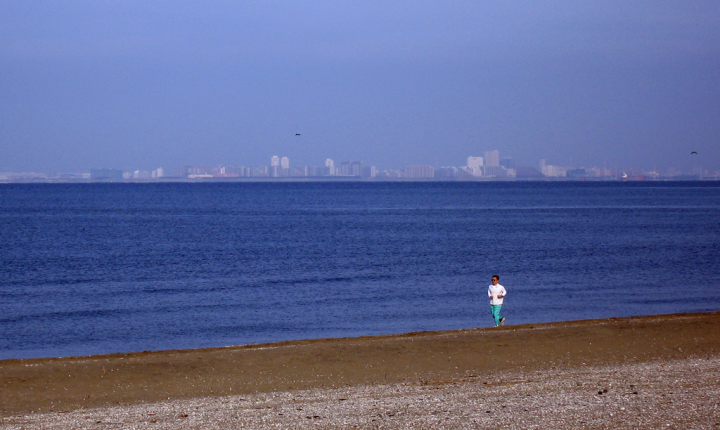
The Ultra-Rare Breed of Chicken

Being a compendium of impressions left during my recent short trip to Japan, illustrated with photographs of Makuhari Beach.
The beach will never feature in the world’s-most-beautiful lists, but it’s nice to walk on when you’re conferenced out. At 6:30AM on a Saturday, it wasn’t crowded.
On Japan in General · I’ve had the good fortune to spend a lot of time visiting Japan over the years, starting sometime around 1990. I’ve also been fortunate in getting to know a lot of fine Japanese people. I’m an admirer of Japanese design and cuisine and urban transport. Also I am continually awestruck by the sheer scale and intensity of Tokyo which I believe operates near the outer limit that a modern city can grow to while remaining functional. It’s a place that should be experienced just for what it is.
At the same time, it’s awful. Narita airport sucks, the weather is often terrible, the endless concrete ugliness is soul-chilling, the attitudes toward women are often medieval, the patterns of work are onerous, and the country is inward-looking to an extent only equaled in my experience by the United States.
The effect is that when I go there, after a couple of days I find myself thinking “How do these good people put up with this? I want to go home!” But then when I haven’t been to Japan for a year or so, I find myself looking for chances to visit again. And every time I do, I’m left with some powerful impressions that I know won’t fade soon.
There’s a park behind the beach, where I found this ferris-wheel on huge steel legs; tiny and rusting, it was kind of sad.
Those Chickens · In my recent fragment on the people I met in Tokyo, I mentioned our dinner in Akasaka at Imaiya. When we settled down to eat and drink, the Sun guys explained (and there was an English menu even, in support) that the restaurant featured Yakitori, a little surprising since that is usually cheap-and-cheerful fare, often served at street stalls and take-out joints.
Not just any yakitori—it featured Hinai-jidori chickens (really, follow that link), raised running free in pristine purity in the remote Japanese countryside. And boy, are they ever good on a skewer.
I had put down the menu and turned to our hosts and said “Could you do us a favor and just order us some good stuff?” and they did. However, the first course was (gasp) chicken sashimi. Like pretty well anyone from the West, my initial reaction combined shock and queasiness. But I thought “This is a modern city, they must have health regulations, and successful restaurants in Akasaka aren’t gonna kill their customers with salmonella.” So I had some, and it was actually pretty good. Tasted like chicken.
The density of shells, some quite beautiful, and also of perfect round smooth skipping rocks, suggest that the beach is not heavily used.
Konishiki · I was in my hotel room and turned on the TV and there was a musical performance, an immense guy in a Hawai’ian shirt sitting down singing duets with this little Japanese woman whose head, standing up, was level with his. She was playing Japanese-sounding chords on a small string instrument (not sure what, not a shamisen) and they both sang.
It turned out to be Konishiki, Hawai’ian-born retired Sumo star, whose fighting weight was about 600 pounds; now a philanthropist and singer. The big guy can sing and I thought the duets delightful, I might even buy one of his records; and then they had Jake Shimabukuro, teenage Hawai’ian ukulele virtuoso on, this kid was absolutely totally mind-boggling. Why don’t I get this kind of stuff on my TV at home?
There was this big long pier lined with birds, I don’t know what kind.
Nature Radio · Speaking of being in my hotel room, every Japanese hotel room has a built-in Fifties-ish radio console with three or four pre-programmed channels. One of them in the Makuhari New Otani (which I don’t particularly recommend, overpriced for what it is and in need of renovation) was a Nature Sounds channel. Since I was on the twentieth floor behind windows that didn’t open looking out on a postmodern nature-free zone (see the last picture here), the tweeting and splashing was more than a little surreal, but I suppose consistent with the general surreality.
The Rhythm of Conversation · I was happy to navigate in from Makuhari to Sun’s downtown office, but Takashi strongly suggested I let him guide, and I was thankful. Here’s how tough Tokyo can be: we got off the train at Tokyo Station, the biggest, and grabbed a cab to the Sun office, which is right next to the Prime Minister’s office and the Parliament. Takashi and the cabbie had two or three extended dialogues to work out the best route. (I’ve taken lots of Tokyo taxis where the driver had to stop and ask for directions).
Anyhow, while Takashi and the driver were talking, I was reminded of how, in Japanese, a dialogue is a collective construction, not just than an exchange of ideas and arguments. The conversational ball bounces back and forth, with the listening party interjecting lots of little encouraging sounds; Japanese has lots of little words (chiefly hai of course) which work well for this. I wonder if I would have enjoyed the rhythm as much if I’d been able to understand what they were saying.
I can’t wait to get back.